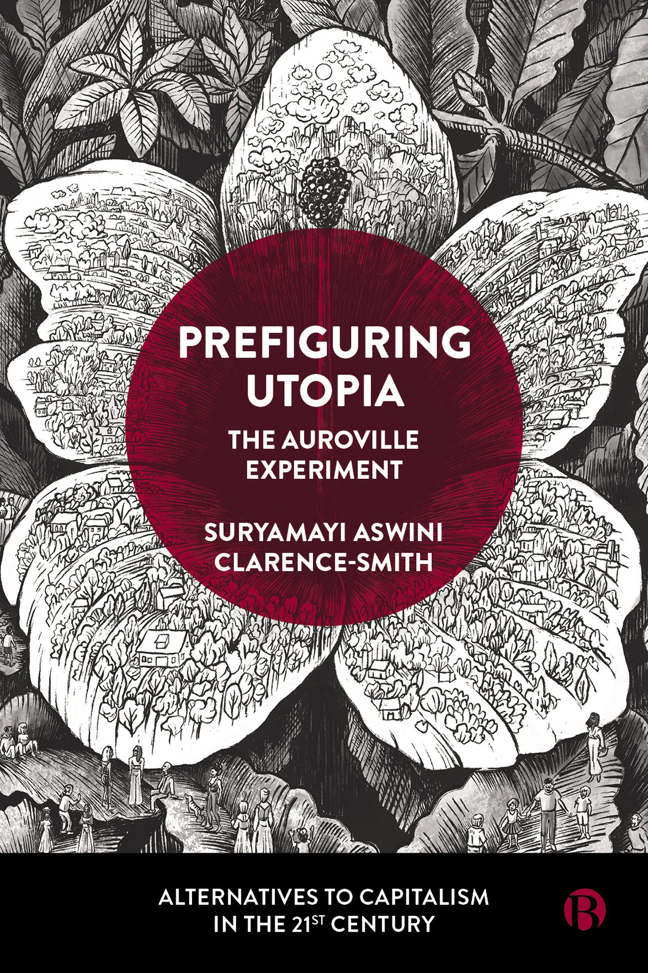Book contents
- Frontmatter
- Dedication
- Contents
- List of Figures and Tables
- Glossary
- About the Author
- Acknowledgements
- Foreword
- 1 All Life is Yoga: An Introduction
- PART I Culture
- PART II Polis
- PART III Economy
- Afterword
- Appendix A A Dream (The Mother, 1954)
- Appendix B The Auroville Charter (The Mother, 1968)
- Appendix C To Be a True Aurovilian (The Mother, 1971)
- Notes
- References
- Index
Afterword
Published online by Cambridge University Press: 24 January 2024
- Frontmatter
- Dedication
- Contents
- List of Figures and Tables
- Glossary
- About the Author
- Acknowledgements
- Foreword
- 1 All Life is Yoga: An Introduction
- PART I Culture
- PART II Polis
- PART III Economy
- Afterword
- Appendix A A Dream (The Mother, 1954)
- Appendix B The Auroville Charter (The Mother, 1968)
- Appendix C To Be a True Aurovilian (The Mother, 1971)
- Notes
- References
- Index
Summary
These days are steeped in a desperate need for radical change in the opposite direction of the world's current trajectory. The ‘profit before life’ motto of global capitalist ‘development’ is destroying the planet and its human and non-human inhabitants. To unlock the present critical situation and bring about the possibility of transitioning from ‘planet crisis’ to ‘planet hope’ resides with those communities creating alternative practices for sustainable life at the grass roots. Critics of localized experiments of alternative forms of being and living in and beyond the capitalist world worry that experiments of holistic, democratic, ecological and cooperative practices will not change the structures, dynamics and powers that sustain global capitalism and its recurrent crises. However, Suryamayi Clarence-Smith's book tells us a different story.
Her autoethnography of Auroville tells us the story of one of the world's most extensive and most well-developed intentional communities. Auroville's Charter states that the community belongs to humanity as a whole, as a place for the flourishing of the human soul and body, bridging past and present. For the past 55 years, Auroville's inhabitants – several thousand, from all over the world – have been reinventing communal life, attaining exceptional levels of ecological restoration and reforestation, a cutting-edge practice of direct democracy, and a new economic model – all from a grass-roots search for real sustainability, beyond grand discourses. Learning about this experience and understanding what was achieved is vital for the needed change our world must work towards.
The impact of this book on our understanding of prefigurative praxis and utopia cannot be overemphasized. Three contributions come to mind. First, Clarence-Smith focuses on process. As she explains, she intended not to document the Auroville community's alternative practices but to investigate the complex processes by which these collective actions and their alternative practices emerge and are established. In addition to many deliberative, organizing and learning activities, praxis encompasses moments of contradiction and conflict. Navigating those contradictions and conflicts, both internal and external, is a component of prefigurative praxis. The second contribution is the clear distinction between abstract and concrete utopia. The main difference between abstract and concrete utopia, writes Ernst Bloch, is that abstract utopia is a ready-made utopia, while concrete utopia is of an anticipatory kind that rejects both abstract utopian dreaminess and immature utopian socialism.
- Type
- Chapter
- Information
- Prefiguring UtopiaThe Auroville Experiment, pp. 151 - 152Publisher: Bristol University PressPrint publication year: 2023



